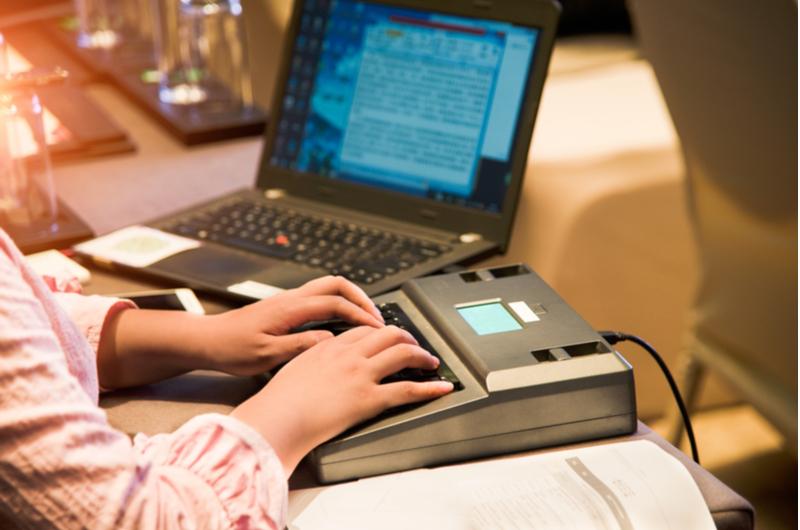Start Career As Court Stenographer
Court stenographers record court proceedings using a stenotype. Learn more about the top schools and skills necessary to be a court stenographer.
Court stenographers record legal proceedings using a unique shorthand language, steno. Steno is based on what syllables are spoken. Focusing on the syllables allows stenographers to quickly record speeches instead of hastily trying to write each individual letter. This is especially important in the courtroom, where both the prosecution and defense are both rapidly talking without pause. During a trial, one party may call on the stenographer to repeat a previously spoken line, so the proceeding must be recorded in real time.
While the majority of stenographers work in a court room setting, stenographers are sometimes requested in other departments. During government proceedings, a court stenographer is sometimes brought in to record the meeting. Some businesses also hire a stenographer during important corporate meetings. Stenographers may also work alongside a television studio to provide closed caption during live meetings. While it is strongly encouraged, you do not need a degree to become a stenographer, but you must obtain the proper licensing. More information about training and getting licensed as a court stenographer is detailed below.
Important Stenography Skills
There are several important skills to become a stenographer. Fast typing is a must for any stenographer, but you also need a general understanding of the information you are recording. Officially, you do not need any kind of degree to become a stenographer, but the majority of court stenographers commonly have at least an associate degree in court reporting. To get a better understanding of the more complicated terms they are expected to record, stenographers are encouraged to study the following topics:
-
Machine technology.
-
Medical and legal terminology.
-
Judicial ethics.
-
Dictation of jury charges.
-
Advanced keyboarding skills.
Additionally, some students find it helpful to take either an American Sign Language (ASL) or deaf studies class. Many community colleges offer court reporting programs. There are also some technical institutions available for court reporters. Even if you do not want a full degree, taking court reporting classes is one of the easiest ways to learn how to use a stenotype. Because it is such a specialized piece of equipment, it is difficult to learn without an instructor. When you are looking for classes, make sure to check whether the class provides a stenographer for you to use, or if you must purchase your own. You may be tempted to save money by using class stenographers, but owning your own machine allows you to practice outside of the classroom.
Stenography School Costs
It typically takes between two to three years to get a degree in court reporting. How much it costs largely varies based on what university you attend, with the average costs ranging between $25,000 and $50,000. Because it involves the courtroom, there are several legal scholarships or grants which apply to court reporting. If you want to focus specifically on using a stenotype, there are also select reporting grants and scholarships available as well. The National Court Reporters Association (NCRA) includes a section for stenographer financial aid programs.
Top Court Stenographer Programs
Alfred State College is a popular school for court reporters. The main program for court stenographers is Court Reporting and Captioning, but an associate is also available for Court and RealTime Reporting. The class offers online classes and is even certified through the NCRA.
You can also take stenography courses through Arlington Career Institute. Arlington is best known for in-person classes, but there are online programs available as well. Classes are offered during both day and night. The biggest appeal of Arlington is the internship options, allowing future stenographers to work with professionals to receive additional training. This also creates networking opportunities for graduates.
Another top university for stenographers is Brown College of Court Reporting. All of the online courses are taught live in real time. This is helpful for students who learn better when they get to directly ask questions of their professor. Brown College also places a much greater emphasis on mastering the stenotype compared to other programs.
Stark State College is another school that focuses on mastering the stenotype. The school does not have as many legal classes as the other schools, but you can still pursue an associate in Judicial Court Reporting. The college also has excellent interning opportunities and sets up mock courtrooms for students to practice their recording skills.
Getting your Stenography License
Even if you obtain an associate degree, you must get additional certification to work as a court stenographer. Stenographers need a license for whatever state they wish to work in. Each state has slightly different requirements to become a stenographer. In some cases, you are allowed to take the certification test whenever you feel you are ready. Other states make you serve as a notary public before taking the exam.
You can complete your certification through the NCRA or from the States Court Reporters Association (USCRA). Many states also offer local certification tests as well. The exams largely focus on your ability to record dictation, testing your overall accuracy and how many words you write per minute.
Once you complete your tests, you can start working as a court stenographer. Court stenographers are in high demand across the United States. Court stenographers are often paid the highest out of all the stenography careers. Your salary varies depending on where you work, but in most states, you make between $20 to $35 an hour as a starting salary. More experienced stenographers working in larger states, like California or New York, often make between $80,000 and $90,000 a year.
